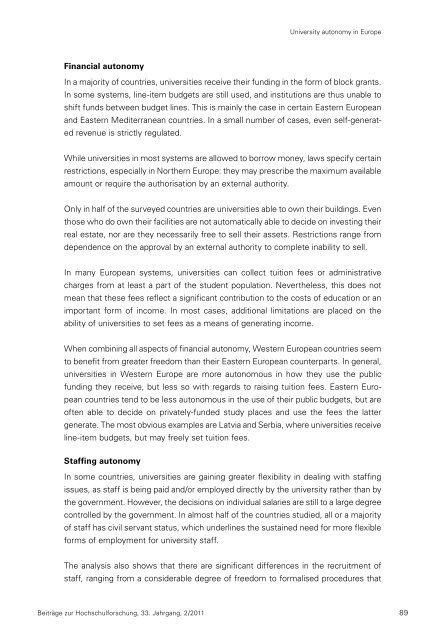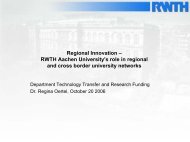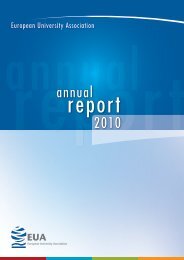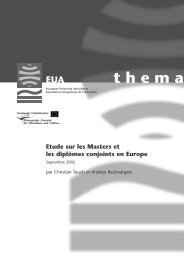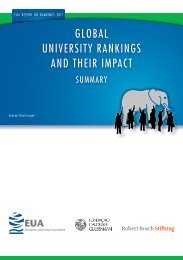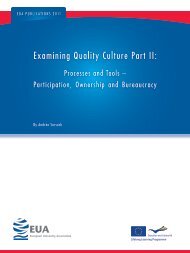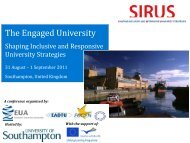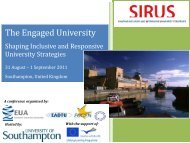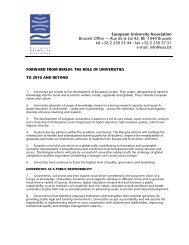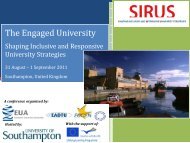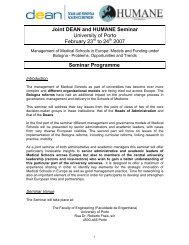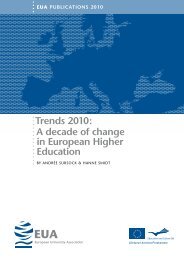Beiträge zur Hochschulforschung - European University Association
Beiträge zur Hochschulforschung - European University Association
Beiträge zur Hochschulforschung - European University Association
You also want an ePaper? Increase the reach of your titles
YUMPU automatically turns print PDFs into web optimized ePapers that Google loves.
Financial autonomy<br />
<strong>University</strong> autonomy in Europe<br />
In a majority of countries, universities receive their funding in the form of block grants.<br />
In some systems, line-item budgets are still used, and institutions are thus unable to<br />
shift funds between budget lines. This is mainly the case in certain Eastern <strong>European</strong><br />
and Eastern Mediterranean countries. In a small number of cases, even self-generat-<br />
ed revenue is strictly regulated.<br />
While universities in most systems are allowed to borrow money, laws specify certain<br />
restrictions, especially in Northern Europe: they may prescribe the maximum available<br />
amount or require the authorisation by an external authority.<br />
Only in half of the surveyed countries are universities able to own their buildings. Even<br />
those who do own their facilities are not automatically able to decide on investing their<br />
real estate, nor are they necessarily free to sell their assets. Restrictions range from<br />
dependence on the approval by an external authority to complete inability to sell.<br />
In many <strong>European</strong> systems, universities can collect tuition fees or administrative<br />
charges from at least a part of the student population. Nevertheless, this does not<br />
mean that these fees reflect a significant contribution to the costs of education or an<br />
important form of income. In most cases, additional limitations are placed on the<br />
ability of universities to set fees as a means of generating income.<br />
When combining all aspects of financial autonomy, Western <strong>European</strong> countries seem<br />
to benefit from greater freedom than their Eastern <strong>European</strong> counterparts. In general,<br />
universities in Western Europe are more autonomous in how they use the public<br />
funding they receive, but less so with regards to raising tuition fees. Eastern Euro-<br />
pean countries tend to be less autonomous in the use of their public budgets, but are<br />
often able to decide on privately-funded study places and use the fees the latter<br />
generate. The most obvious examples are Latvia and Serbia, where universities receive<br />
line-item budgets, but may freely set tuition fees.<br />
Staffing autonomy<br />
In some countries, universities are gaining greater flexibility in dealing with staffing<br />
issues, as staff is being paid and/or employed directly by the university rather than by<br />
the government. However, the decisions on individual salaries are still to a large degree<br />
controlled by the government. In almost half of the countries studied, all or a majority<br />
of staff has civil servant status, which underlines the sustained need for more flexible<br />
forms of employment for university staff.<br />
The analysis also shows that there are significant differences in the recruitment of<br />
staff, ranging from a considerable degree of freedom to formalised procedures that<br />
<strong>Beiträge</strong> <strong>zur</strong> <strong>Hochschulforschung</strong>, 33. Jahrgang, 2/2011 89


